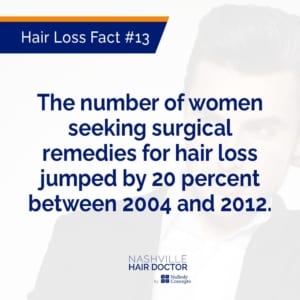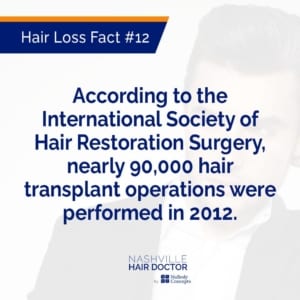Yes, National Hair Loss Awareness Month is a thing. And it’s happening right now. We’d like to point out that for us at Hair Doctor, we are more than aware of hair loss year-round, every month of the year. But it’s still nice to have an entire month dedicated to it.
A lot of the talk surrounding hair loss is a combination of fact and myth. To combat hair loss effectively, it’s important to know what you’re dealing with.
So we thought, let’s talk some facts during Hair Loss Awareness Month.
What to Know About Hair Loss
How Common is Hair Loss?
We know it’s frustrating to look in the mirror and realize your hairline is receding. Or worse, that your hair is perilously thin on the top of your head. But it can be comforting to know you’re not alone.
The fact is, 40 percent of men have noticeable hair loss by the age of 35. Alopecia – the medical term for hair loss – is not a rare condition by any means. It is so common that around 25% of men who are affected by hair loss begin to see the first signs before the age of 21.
Read More: Can a Hair Transplant Fix All Hair Loss?
So Hair Loss Only Affects Men?
No, not true. Women are not immune to hair loss. Historically, women might have suffered their hair loss more silently, but they are realizing that surgical solutions like hair transplants are for them too. Between 2004 and 2012, the number of women seeking surgical remedies for hair loss jumped by 20 percent.
At Nashville Hair Doctor we currently only offer FUE hair transplants to male patients. If you are a female patient, please check again in the future.

What Causes Hair Loss?
Ah, we thought you’d never ask. Most hair loss is caused by genetics, pure and simple. Yes, it can also be caused by anxiety and stress, or disease. Women can experience postpartum hair loss. But for the most part – in over 95% of men, to be precise – whether you suffer typical male pattern baldness is predetermined genetically. Certain gene mutations have been linked to hair loss, and no, it’s not just through your maternal grandfather.
Read More: The Genetics of Balding
What Can I do to Prevent Hair Loss?
Because hair loss is genetic, there is not much you can do to prevent it. The Internet might be full of myths about hair loss and tips for remedies, but if you suffer from genetic baldness, the only thing that can reverse your hair loss is a hair transplant.
Washing and shampooing your hair too often does not cause hair loss. Getting haircuts more or less often does not change the way your hair grows. And, for the love of God, please don’t stop wearing hats because they might cause hair loss. They don’t!
Read More: What’s the Best Nonsurgical Hair Loss Treatment?
What Does a Hair Transplant Do?
Just in case you’re wondering, a hair transplant does not give you someone else’s hair, like an organ transplant does. For a hair transplant, hair from an area on your head that is not affected by hair loss is moved to the area that needs it.
There are various methods to accomplish this. At the Hair Doctor, we use a method called Follicular Unit Extraction, whereby hair grafts consisting of a few follicles each are transplanted one by one.
Which Hair Transplant Method Works Best?
The two main hair transplant methods are the so-called Strip Method and NeoGraft, which uses the aforementioned Follicular Unit Extraction technology.
We prefer Neograft over the strip method for several reasons: Since no hair strip is removed from your scalp, there won’t be a linear scar with NeoGraft. The little pinpricks from where follicles are removed and re-inserted scab over and heal within a week. And since there won’t be the need for any surgical incisions, you’ll be back on your feet (and at work) much, much faster after your procedure.
Read More: Not All Hair Transplants are Created Equal
Are Hair Transplants Permanent?
Yes, they are! The beauty of hair transplants stems from the way male pattern baldness works. It only affects some of your hair, not all of it. And a seasoned hair transplant technician knows exactly where to harvest your hair and how to extract it so that the donor site looks the same as before. This donor hair is not affected by hair loss, meaning you won’t lose it at some later point.
You might lose more of your hair in the areas where you’ve already been losing it, which might lead to further thinning down the road, but your original transplant will not be affected.
Read More: How to Avoid Repeat Treatments
Are Hair Transplants Painful?
We know what you’re thinking now: It sounds too good to be true. So what’s the downside? Perhaps it’s just really painful to have a hair transplant?
We must disappoint you on that count. Hair transplants are really not painful. Your technician applies some numbing to each area as he works on it to avoid any mild discomfort there might be. Other than that, it feels like one long extended session at the barber. Armed with a TV remote, you are left to a lot of channel surfing or, if you’re into it, listening to podcasts.
Read More: A Hair Transplant Journey – Hair Doctor Patient David’s Video Diary
How Do I know if I’m Eligible for a Hair Transplant?
We get it. You’re busy and don’t feel like visiting a hair clinic just to learn that a hair transplant might not be for you. We make it super easy for prospective patients: Simply visit our Quote Request Page, upload your picture and submit. Our hair restoration specialist will get back to you with a quote specifically geared towards your hair loss type.
Get Started: Upload Your Picture Here.
We hope we’ve helped you learn more about the causes of hair loss and what you can do to reverse it. Perhaps this National Hair Loss Awareness Month will get you started on growing back your hair. If so, your experts at Hair Doctor are here to help – available in Nashville, Memphis, and Louisville for your convenience, but also serving out-of-town patients at our Nashville location.





